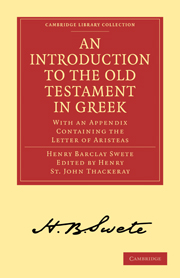Book contents
- Frontmatter
- PREFACE
- Contents
- PART I THE HISTORY OF THE GREEK OLD TESTAMENT AND OF ITS TRANSMISSION
- PART II THE CONTENTS OF THE ALEXANDRIAN OLD TESTAMENT
- PART III LITERARY USE, VALUE, AND TEXTUAL CONDITION OF THE GREEK OLD TESTAMENT
- CHAPTER I Literary use of the Septuagint by non-Christian Hellenists
- CHAPTER II Quotations from the Septuagint in the New Testament
- CHAPTER III Quotations from the Septuagint in early Christian writings
- CHAPTER IV The Greek Versions as aids to Biblical Study
- CHAPTER V Influence of the Septuagint on Christian Literature
- CHAPTER VI Textual condition of the Septuagint, and problems arising out of it
- ADDITIONS AND CORRECTIONS
- APPENDIX: THE LETTER OF PSEUDO-ARISTEAS
- INDICES
CHAPTER II - Quotations from the Septuagint in the New Testament
Published online by Cambridge University Press: 05 August 2011
- Frontmatter
- PREFACE
- Contents
- PART I THE HISTORY OF THE GREEK OLD TESTAMENT AND OF ITS TRANSMISSION
- PART II THE CONTENTS OF THE ALEXANDRIAN OLD TESTAMENT
- PART III LITERARY USE, VALUE, AND TEXTUAL CONDITION OF THE GREEK OLD TESTAMENT
- CHAPTER I Literary use of the Septuagint by non-Christian Hellenists
- CHAPTER II Quotations from the Septuagint in the New Testament
- CHAPTER III Quotations from the Septuagint in early Christian writings
- CHAPTER IV The Greek Versions as aids to Biblical Study
- CHAPTER V Influence of the Septuagint on Christian Literature
- CHAPTER VI Textual condition of the Septuagint, and problems arising out of it
- ADDITIONS AND CORRECTIONS
- APPENDIX: THE LETTER OF PSEUDO-ARISTEAS
- INDICES
Summary
1. The writings of the New Testament were the work of some nine authors, of different nationalities and antecedents. Six of them, according to the traditional belief, were Palestinian Jews; a seventh, though ‘a Hebrew of Hebrew parentage,’ belonged by birth to the Dispersion of Asia Minor; of the remaining two, one was possibly a Gentile from Antioch, and the other a ‘Hellenist with Alexandrian proclivities.’ Some diversity of practice as to the literary use of the Greek Old Testament may reasonably be expected in a collection of books having so complex an origin.
With few exceptions, the books of the New Testament abound in references to the Old Testament and in quotations from it. An exhaustive list of these may be seen at the end of Westcott and Hort's New Testament in Greek (Text, p. 581 ff.), and in their text the corresponding passages are distinguished by the use of a small uncial type. But this device, though otherwise admirable, does not enable the student to distinguish direct citations from mere allusions and reminiscences; and as the distinction is important for our present purpose, we will begin by placing before him a table of passages in the Old Testament which are formally quoted by New Testament writers.
- Type
- Chapter
- Information
- An Introduction to the Old Testament in GreekWith an Appendix Containing the Letter of Aristeas, pp. 381 - 405Publisher: Cambridge University PressPrint publication year: 2010First published in: 1900



